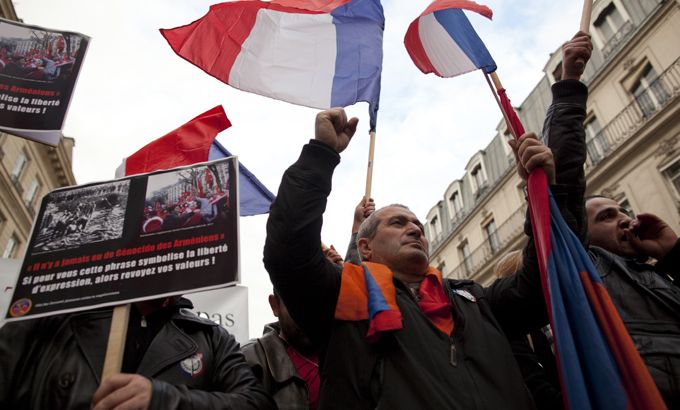
Debating genocide
Why is Sarkozy so determined to pass a law making it illegal to deny that the mass killings of Armenians was genocide?
France’s highest legal authority has blocked a law that would have made it illegal to deny the Armenian genocide at the hands of Ottoman Turks.
|
“As far as historians are concerned, the genocide of Armenians is an indisputable fact …. The real question is what is the politicians business in this affair? And I think it is very clear to most of us that what we are witnessing here is a political wrangle over an historical event exploited for political reasons by all sides.“ – Pierre Purseigle, a lecturer in Modern History |
The constitutional council said it went against the freedom of expression.
But Nicolas Sarkozy, the French president, has reacted angrily, promising a new version of the law as soon as possible.
In a written statement, Sarkozy’s office said: “The president of the republic considers that genocide denial is intolerable and must therefore be punished.”
The new legislation would have punished deniers with prison terms and a fine.
Not surprisingly, relations between France and Turkey, which rejects the use of the term ‘genocide’, were soured when the draft was approved by the French parliament last month.
Ahmet Davutoglu, the Turkish foreign minister, has welcomed Tuesday’s ruling, saying: “The French constitutional committee’s ruling is in compliance with universal human rights and European values that we all favour. In this respect I would like to congratulate the constitutional committee.”
|
“If an opinion about history, if you define it as an insult you will have endless numbers of laws that ban freedom of speech and freedom of thought.“ – Mustafa Akyol, a Turkish writer |
But with Sarkozy declaring that he is ready to try again, we ask: Why is he so determined and what does this mean for relations between France and Turkey?
How do Armenians feel about the constitutional council’s ruling and should it be a criminal offence to dispute whether or not genocide took place?
Joining Inside Story to discuss this are: Pierre Purseigle, a senior lecturer in Modern History at the University of Birmingham; Robert Aydabirian, the president of the Armenian Observatory; and Mustafa Akyol, a Turkish writer, author of the book Islam Without Extremes: A Muslim Case for Liberty and the deputy editor of Turkish Daily News.
| “There is a memory about genocide; the memory of a people who have been killed or displaced or uprooted from their land. That memory exists in France, it exists in America because we are the descendants of the people who survived that genocide. And that memory, you cannot play with it, you cannot manipulate it for political or other reasons.” |
|
The genocide debate:
|
Click here to watch Grandma’s Tattoos, a family story that reveals the fate of the Armenian women driven out of Ottoman Turkey during World War I.